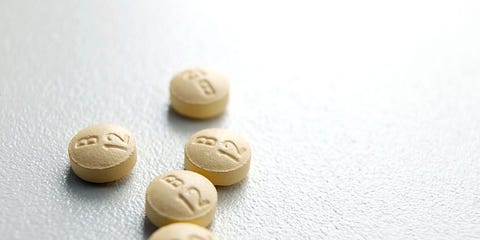
Shutterstock
Earlier this month, a friend of mine barely avoided a nasty fall when she passed out during a hiking trip. Her diagnosis? B12 deficiency. Once she learned the symptoms, she realized it had been progressing for months unnoticed, and her experience isn't rare. It's time to put B12 in the spotlight.
Vitamin B12 is vital for your nervous system and for creating DNA and RNA, the building blocks of every cell in your body. You need B12 to maintain everything from your mood to your digestion. Yet many people have no idea about the signs and symptoms of low B12.
MORE: 5 Ways to Sneak More Fiber Into Your Diet
In fact, a B12 deficiency can go undiagnosed for years, despite causing difficult symptoms like extreme fatigue, shortness of breath, and muscle weakness. If you keep forgetting your to-do list or have trouble finding the right words, pay attention. The same goes for any numbness or tingling in your hands and feet.
It's easy to miss the signs of B12 deficiency or chalk them up to stress or busyness. But if one or more of the following are true for you, it's time to take notice.
This story was originally published by our partners atRodaleWellness.com.
You're a vegetarian or vegan.
The only way to get vitamin B12 in your diet is by eating meat. If you avoid animal products, then a B12 deficiency is guaranteed, unless you supplement. In fact, that's a big part of how the "pale, weak vegan" stereotype came to be: Chronic B12 deficiency causes pale skin and weakness. No need to abandon your diet preferences or moral choices, but do take B12 every day.
You are over the age of 50.
Age brings wisdom and freedom, but unfortunately, it also hampers your ability to absorb B12 from your diet. Not only are you more likely to have a B12 deficiency as you get older, symptoms of B12 deficiency like memory changes or a lack of stamina are more easily missed. If you are over the age of 50, taking a quality B12 supplement offers the best chance of staying fit and strong.
MORE: 7 Ways to Increase Longevity and Turn Back the Clock
You drink alcohol regularly.
You take acid reflux medication.
Whether you take a little purple pill or have had an ulcer in the past, stomach problems and the medications used to treat them prevent your body from absorbing B12. Research is only now revealing the full connection, but studies have proved that this much is true: If you're treating acid reflux, you should be taking B12.
MORE: 9 Natural Ways to Slow Down Aging
You've been diagnosed with diabetes or an autoimmune disease.
Blood sugar issues and disorders like Hashimoto's or lupus mean your body is less likely to absorb B12 from your diet. Even if you're a regular meat-eater, you'll probably still need to take a B12 supplement to maintain healthy levels.
A vitamin B12 deficiency can make you feel awful, and it's been linked to a number of scary diagnoses. Low B12 levels can increase your risk for heart disease, and they've also been linked to depression and anxiety disorders, as well as symptoms of Alzheimer's, autism, and mental illness.
Bottom line: B12 deficiency can be devastating, and it's easily avoidable. Supplementing is quick and safe; because B12 is a water-soluble vitamin, your body uses what you need and your kidneys simply flush away the rest, without any side effects.
The most effective ways to take a B12 supplement are sublingually or as a shot. Since most people don't like the idea of injections, a sublingual supplement is the simple answer. ("Sublingual" just means using drops or a lozenge that melts in your mouth. It's especially useful for people who don't absorb B12 well in their stomachs because of medication use or other digestive issues.)
If any of the five categories above apply to you—and especially if more than one applies!—consult your health care practitioner today about taking B12.
This content is created and maintained by a third party, and imported onto this page to help users provide their email addresses. You may be able to find more information about this and similar content at piano.io
woolcockyousagannot.blogspot.com
Source: https://www.prevention.com/health/g20487266/5-reasons-you-need-more-b12/
